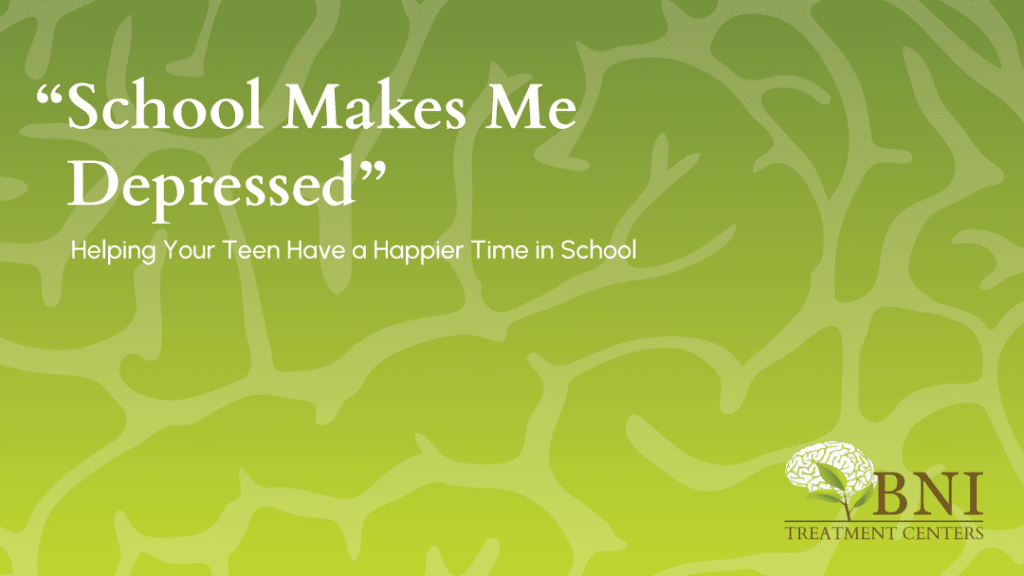School is meant to be a place of safety, growth, and opportunity. Yet for many students, it is instead a source of fear, anxiety, and …
“School Makes Me Depressed” – Helping Your Teen Have a Happier Time in School
BNI treatment’s ODD Treatment program combines evidence-based therapies such as CBT, DBT, behavior modification, and trauma-informed care to help teens gain control over their reactions, improve frustation tolerance, and develop healthier ways to communicate and cope.

School is meant to be a place of safety, growth, and opportunity. Yet for many students, it is instead a source of fear, anxiety, and depression.
In 2022, the Annie Casey Foundation reported that rates of depression among California youth have increased by more than 70% since 2016. In many cases, teens report school as a large factor in their feelings of anxiety and stress. At BNI, we have seen this surge firsthand, and this is why our teams are specifically equipped to help with education.
Understanding the role school can play in adolescent depression will help you keep your own child safe, healthy, and happy. Today, we’re going to answer the ever-present question in your teen’s mind: “Why does school make me depressed?”
School and Its Impact on Mental Health
School is where your teen will spend a huge chunk of their waking hours. It’s an environment which every day influences their mood, stress levels, and emotions. Knowing how it can contribute to depression is an important key to understanding your child’s mental health.
Social and Academic Pressures
School has many factors that influence teens’ mental health. These factors may be academic, with high workloads and fear of failure constantly on students’ minds. The high workloads students face each day add extra stress, taking up mental space and increasing feelings of worry or anxiety. Adolescents often feel pressure, as though their entire future rides on each and every class. When you’re a young teenager working hard to get through school, it often feels like a single failed class can derail your whole life.
These factors are also social. Schools are not just institutes of learning. They are institutes of socialization, the main place your teen will spend time with others. How easy it is for them to make friends often contributes heavily to their feelings of anxiety, sadness, or loneliness. Social isolation is a huge predictor of depression. When you’re a young teenager who hasn’t yet fit in, feeling excluded from groups can be devastating.

Identifying Symptoms of Depression in Teens
It’s important to understand the signs of depression unique to students. While every individual is unique, there are several universal symptoms that your teenager may show.
Emotional Symptoms of Depression
One of the hallmarks of depression is its impact on emotions. Your teen may exhibit persistent sadness, but that’s not the only sign to look out for. Others include emotional outbursts, sudden displays of intense annoyance or frustration that seem to come out of nowhere. Also, seeming withdrawn, not caring about their hobbies or events, and general apathy are common warning signs.
Behavioral Symptoms of Depression
Your child’s behavior may suddenly shift in subtle or dramatic ways. Look for sudden changes in their schoolwork, or the time they spend on it. Pay attention to how often they go out with friends, as they may suddenly no longer seem interested in spending time with them. A final key warning can be in what is known as “self-talk”. While not true for everyone, many teens who live with depression have low self-esteem, which can come out in the negative way they speak to themselves.
Physical Symptoms of Depression
Some of the most prominent signs of teen depression can be physical. If your teen suddenly starts sleeping at wildly different hours, or for longer stretches of time than before, this could be a sign of depression. Persistent exhaustion may be present, where your child seems exhausted no matter how much sleep they get. Pay attention to eating habits, as depression often impacts the desire for food, and how much they seem to enjoy it.
Tools to Help Your Teen Cope with Depression
There is not a one-size fits-all approach to depression. This is why our team is composed of trained psychiatrists, able to provide individual care to every teen who comes to us for depression. However, there are tools to help address, fight, and mitigate depression available to all. Remember, these tools are meant to be collaborative. It’s important that your teen is willing to commit to any potential assistance, and it isn’t forced on them.
Lifestyle Changes
While these are often seen as cliche, lifestyle changes are some of the most impactful for young adults actively managing depression. Getting enough sunshine, especially early in the morning, can have a huge impact on mood. Physical health, largely through good sleeping habits and exercise, directly boosts emotional well-being. Additionally, a less social-media infused lifestyle is shown to directly improve feelings of self-worth.
Communication Techniques
One of the hallmarks of depression is a sense of social isolation. When things are going bad, your child may feel completely alone, that nobody understands or even cares. By encouraging open lines of communication, and especially taking a posture of active listening, you will help your teen open up and communicate more effectively. Simply being listened to can dramatically help your teen process their feelings.

Helping Students with Depression in California
In a perfect world, schools would have all of the resources to properly watch for these symptoms themselves. They would be able to address issues of depression, social isolation, and anxiety. However, this isn’t always possible. That’s why proper treatment for depression and support from a trusted care team is so important.
The mental health concerns facing teenagers today are more prominent than ever before. By learning to recognize signs of depression, you can be better prepared to understand or to help your child through a difficult time.
If your teen is living with depression, know that you are not alone. At BNI, we are world-class experts at treating depression, as well as other mental health conditions or substance use disorders. We believe in an individual approach, one in which we listen carefully, and then tailor our plans to the specific needs of your child. We work alongside the school system to ensure that their education is kept on track, all while working toward a brighter future. To learn more about our treatment programs, please call us at 888-522-1504.
BNI Treatment Centers: Science-based, evidence-backed, compassion-led.
Frequently Asked Questions
“Is my child just stressed, or is it something more?”
While every situation is different, it’s important to look at the intensity and duration of the symptoms. Stress or any other factor may change behavior and mood temporarily, but over time your child will return to their usual baseline. If problems persist over time, it warrants more serious attention.
“Will my child need medication? I’m worried about the side effects.”
It’s understandable to have concerns. Medication is only one part of a broader treatment plan, and should always be considered alongside a registered psychiatrist. This is why at BNI, we employ the best psychiatrists to provide individual treatment plans for each patient.
“My child refuses to talk about it. What can I do?”
A: Pressure won’t help. Expectations often serve to push your child away. Instead, focus on communicating with them without judgment, taking a listening-first approach to the issue.
About the Author

Arastou Aminzadeh, M.D.
Dr. Arastou Aminzadeh or Dr. A as most teens refer to him, has been working in variety of clinical settings for the last 20 years. He is well respected nationally for his expertise in Addiction medicine and treating adolescents. Dr. A is a triple board certified physician in psychiatry, Child and Adolescent psychiatry and Addiction medicine.

Oliver Ahmadpour, M.D.
Dr. Oliver Ahmadpour is an adult and child psychiatrist with nearly four decades of experience in the field of medicine with an M.D. degree from Sweden, where he practiced as an Internal Medicine physician. In the U.S. he completed his Post-Doctoral Fellowship in Endocrinology at UCSD, and his Residency and Fellowship in Adult, Child, and adolescent Psychiatry at USC Keck School of Medicine.
Free Insurance Verification
News & Resources for Families
Check Out Our Recent Articles
Frequently Asked Questions
We treat a wide range of teen mental health challenges including anxiety, depression, bipolar disorder, OCD, trauma-related disorders, behavioral issues, ADHD, oppositional defiance, substance use, and dual-diagnosis conditions. Many families come to BNI after struggling to find the right level of care elsewhere.
Most private insurance plans cover a significant portion of treatment. Our admissions team verifies benefits quickly and explains coverage, deductibles, and out-of-pocket expectations before admission. We do not accept Medi-Cal or Medicare.
Yes. Many families come to BNI with teens who have complex diagnoses, treatment-resistant depression, severe anxiety, self-harm history, or previous hospitalizations. Our clinical leadership regularly treats high-acuity cases and provides specialized expertise for them.
Absolutely. We use established, research-backed modalities including CBT, DBT, trauma-informed care, psychiatric medication management, experiential therapies, family systems work, and integrative approaches such as mindfulness, yoga, and expressive arts.
Our residential and outpatient programs are located in private, secure homes in Agoura Hills and Calabasas. These areas are known for their safety, privacy, and access to nature—ideal for focused healing and recovery.
Yes. BNI is trusted by the UCLA David Geffen School of Medicine as a training rotation site for physician fellows to learn best practices in adolescent mental health—an acknowledgment of our clinical quality and leadership in teen psychiatry.
What We Treat
Primary Mental Health

Primary Mental Health
Behavioral Issues

Behavioral Issues
Dual-Diagnosis


